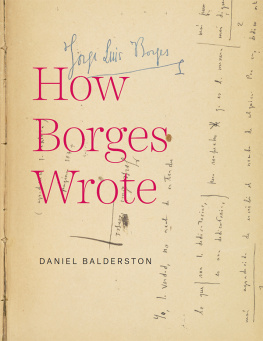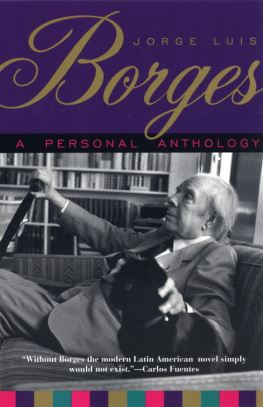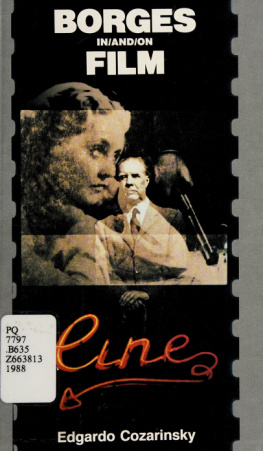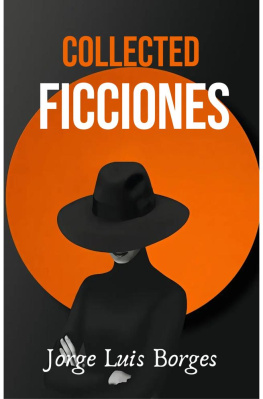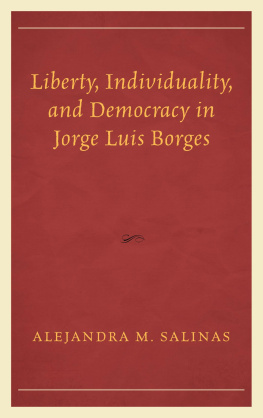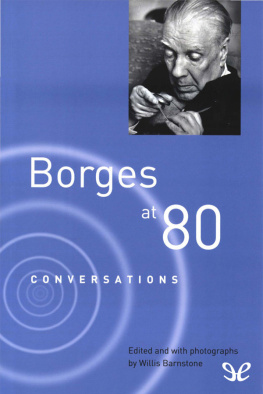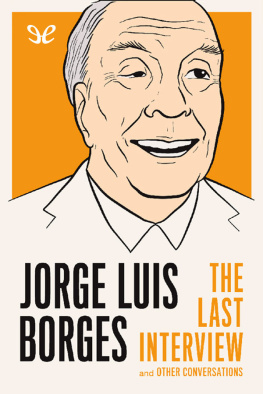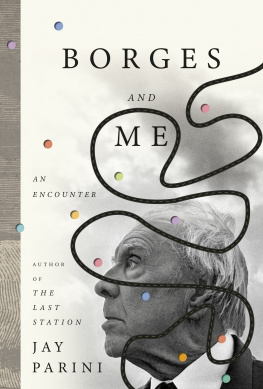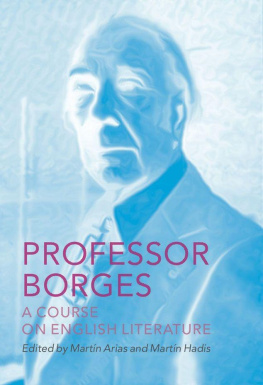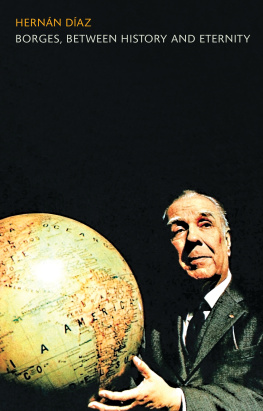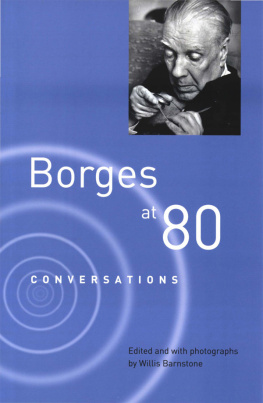Daniel Balderston - How Borges Wrote
Here you can read online Daniel Balderston - How Borges Wrote full text of the book (entire story) in english for free. Download pdf and epub, get meaning, cover and reviews about this ebook. publisher: Lightning Source Inc. (Tier 3), genre: Detective and thriller. Description of the work, (preface) as well as reviews are available. Best literature library LitArk.com created for fans of good reading and offers a wide selection of genres:
Romance novel
Science fiction
Adventure
Detective
Science
History
Home and family
Prose
Art
Politics
Computer
Non-fiction
Religion
Business
Children
Humor
Choose a favorite category and find really read worthwhile books. Enjoy immersion in the world of imagination, feel the emotions of the characters or learn something new for yourself, make an fascinating discovery.
- Book:How Borges Wrote
- Author:
- Publisher:Lightning Source Inc. (Tier 3)
- Genre:
- Rating:4 / 5
- Favourites:Add to favourites
- Your mark:
- 80
- 1
- 2
- 3
- 4
- 5
How Borges Wrote: summary, description and annotation
We offer to read an annotation, description, summary or preface (depends on what the author of the book "How Borges Wrote" wrote himself). If you haven't found the necessary information about the book — write in the comments, we will try to find it.
How Borges Wrote — read online for free the complete book (whole text) full work
Below is the text of the book, divided by pages. System saving the place of the last page read, allows you to conveniently read the book "How Borges Wrote" online for free, without having to search again every time where you left off. Put a bookmark, and you can go to the page where you finished reading at any time.
Font size:
Interval:
Bookmark:
Borges
Wrote
DANIEL BALDERSTON
University of Virginia Press
CHARLOTTESVILLE AND LONDON
University of Virginia Press
2018 by the Rector and Visitors of the University of Virginia
All rights reserved
Printed in the United States of America on acid-free paper
First published 2018
9 8 7 6 5 4 3 2 1
Library of Congress Cataloging-in-Publication Data
Names: Balderston, Daniel, 1952 author.
Title: How Borges wrote / Daniel Balderston.
Description: Charlottesville : University of Virginia Press, 2018. | Includes bibliographical references and index.
Identifiers: LCCN 2017012511 | ISBN 9780813939643 (cloth : alk. paper) | ISBN 9780813939650 (e-book)
Subjects: LCSH: Borges, Jorge Luis, 18991986Criticism and interpretation. | Borges, Jorge Luis, 18991986Themes, motives.
Classification: LCC PQ7797.B635 Z62285 2017 | DDC 868/.6209dc23
LC record available at https://lccn.loc.gov/2017012511
Cover art: Borgess signature and handwritten notes from his copy of Noches ticas by Aulus Gellius. (Albert and Shirley Small Collection, University of Virginia)
The writing of this book has been long and arduous. Initially the problem was the lack of material; later, the abundance. I am greatly in the debt of many people who helped along the way, most notably Donald Yates, Nicols Helft, Vctor Aizenman, Soledad Costantini, and Jared Loewenstein. Three dear friends did not live to see the book itself: Michel Lafon, with whom I had several important conversations early in the project; Ricardo Piglia, whose enthusiasm pushed me along; and Donald Yates, who was helpful throughout and was eager to see the final product. The various catalogues of Lame Duck Books were invaluable, as was the help of Lies Wijnterp, Nora Benedict, and Mara Eugenia Mudrovcic. Many colleagues were generous with invitations to speak about this project as it evolved: Maarten Steenmeijer at Radboud Universiteit Nijmegen, Laura Rosato and Germn lvarez at the Biblioteca Nacional, Rafael Olea Franco at the Colegio de Mxico, Michelle Clayton at Brown, Cecilia Gonzlez at the Universit de Bordeaux, Sergio Romanelli at the Universidade Federal de Santa Catarina, Mara del Carmen Marengo at the Universidad Nacional de Crdoba, Hlmfrur Gararsdttir at the University of Iceland, Damaris Puales-Alpzar at Case Western Reserve, Ana Cara at Oberlin, Miguel Fernndez at Middlebury, Fernando Degiovanni at Wesleyan and then again at CUNY Graduate Center, Hctor Hoyos at Stanford, Jernimo Pizarro at the Universidad de los Andes, Diana Paola Guzmn at the Universidad Jorge Tadeo Lozano, Cecilia Esparza and Susana Reisz at the Pontificia Universidad Catlica del Per, Elton Honores at the Universidad Mayor Nacional de San Marcos, Gonzalo Cornejo at the Centro de Estudios Literarios Antonio Cornejo Polar, Mariela Blanco at the Universidad Nacional de Mar del Plata, Cristina Iglesia at the Universidad de Buenos Aires, Gabriela Nouzeilles at Princeton, Bill Richardson at the National University of Ireland-Galway, Magdalena Cmpora at the Universidad Catlica Argentina, Alejandro Higashi at the Universidad Autnoma Metropolitana-Iztapalapa, Edwin Williamson at Oxford, John Kraniauskas and Mari Paz Balibrea at Birkbeck College, Stephen Hart at University College London, Peter Logan at Temple University, Magdalena Lpez at the Universidade de Lisboa, and Juan Carlos Gonzlez Espitia at the University of North Carolina. I am grateful to students in the courses I have taught on Borges manuscripts at the University of Pittsburgh, the Universidad Nacional Autnoma de Mxico, the Universidad de Buenos Aires, and the Universidad Nacional de Mar del Plata. Colleagues with whom I have had illuminating conversations about genetic and textual criticism include Julio Premat, Fernando Degiovanni, John Bryant, Jacques Neefs, Mariana Di Ci, Graciela Villanueva, Alfredo Alonso Estenoz, Sergio Delgado, Mara Laura Bocaz, Ana Ins Larre Borges, Sam Slote, Mariela Blanco, Claudia Rosa, Ricardo Piglia, Peter Shillingsburg, Alejandro Higashi, Randall Halle, Mara Julia Rossi and (last but certainly not least) lida Lois; special thanks to Fernando Degiovanni, Mara Julia Rossi, Donald Yates, Evelyn Fishburn, John Bryant, and lida Lois for their careful reading of the manuscript. Editors of journals where I have published earlier versions of sections of this project are Horacio Gonzlez, Carina Blixen, Sal Sosnowski, Lukasz Grtzmacher, Julio Premat, Beatriz Curia, Marina Martn, and Juan Duchesne-Winter. Thanks to all the contributors to the genetic criticism issue (no. 246) of the Revista Iberoamericana and to issue 38 of Variaciones Borges (focused on Borges manuscripts). Special thanks to several librarians: Richard Watson and Cameron McCoy at the Harry Ransom Center, Thomas Lannan and Tal Nadan at the New York Public Library, Peter Berg at the Michigan State University Libraries, and Regina Rush at the University of Virginia Library. Without Laura Rosato and Germn lvarez none of this would have been possible. I am grateful to Dean N. John Cooper, Dean James F. Knapp and Provost Patricia Beeson here at the University of Pittsburgh for their support, as well as to the Center for Latin American Studies. Gustavo Quinteros patience and attention to detail were very welcome in the preparation of the images and of the final version of the manuscript; Gustavo Vargas helped check questions that were raised by the copy editor. It has been wonderful working with Angie Hogan, Morgan Myers, and Susan Murray at the University of Virginia Press. And a very special thanks: since early in our relationship, Hernn Martnez Milln has been urging me to concentrate on this project, and I am glad to finally pay him back for his insistence. This book is his in every way.
Permission has been granted by the Harry Ransom Center at the University of Texas for use of images of the manuscript of Destino escandinavo and the typescript of Emma Zunz.
The New York Public Library gave permission for use of images of the manuscripts of La lotera en Babilonia and El pudor de la historia.
Permission has been granted by Special Collections at the Michigan State University Libraries for use of images of the manuscripts of La muralla y los libros, Evaristo Carriego, and an unpublished talk on Franz Kafka.
Mara Soledad Costantini gave permission for use of images of the Lanceros Argentinos de 1910 notebook cover and the manuscript of Hombre de la esquina rosada.
Permission has been granted by Andrew Wylie Agency on behalf of the Borges Estate for use of Borges quotations and for the publication of manuscript material.
Permission was granted by Penguin USA, Penguin Canada, and Penguin UK for use of Andrew Hurleys translation of the long sentence in The Aleph.
Support for this publication has been provided by the Richard D. and Mary Jane Edwards Endowed Publication Fund in the Dietrich School of Arts and Sciences of the University of Pittsburgh.
Recuerdo sus cuadernos cuadriculados, sus negras tachaduras, sus peculiares smbolos tipogrficos y su letra de insecto.
PIERRE MENARD, AUTOR DEL QUIJOTE
Jorge Luis Borges (Buenos Aires 1899Geneva 1986) is often called the greatest reader in all of world literature since his writings contain (and sometimes conceal) hundreds of thousands of allusions to works well and little known, in many languages and on diverse subjects. Susan Sontag observed just after his death in 1986: That, of course, was part of your modesty: your taste for finding your ideas in the ideas of other writers (111). but in the meantime a lot of work can be done on the manuscripts and marginalia.
In Crtica del paisaje (an essay from 1921, at the very beginning of his long career) Borges writes: Lo marginal es lo ms bello (
Font size:
Interval:
Bookmark:
Similar books «How Borges Wrote»
Look at similar books to How Borges Wrote. We have selected literature similar in name and meaning in the hope of providing readers with more options to find new, interesting, not yet read works.
Discussion, reviews of the book How Borges Wrote and just readers' own opinions. Leave your comments, write what you think about the work, its meaning or the main characters. Specify what exactly you liked and what you didn't like, and why you think so.

